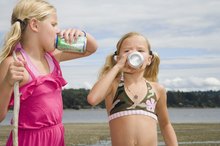The Effects of Carbonated Beverages on Kidneys
Drinking soda or other carbonated beverages each day may be a recipe for high blood pressure, reduced kidney function and kidney stones. This setup for kidney disease happens through a number of actions that take place when you consume just two carbonated beverages a day for a long period of time. You may think sugar-free diet soda may shield you from these adverse health effects, but you’d be wrong. Be it a cola, non-cola, diet soda or other sugar-sweetened carbonated beverage, carbonated beverages can increase your risk of serious health issues.
Carbonation and Kidney Stones
Soda, especially colas, contains high levels of phosphoric acid, which is closely linked with the development of kidney stones and other renal problems. A seminal study published in 2007 in the journal “Epidemiology” reckoned that drinking two or more colas per day was associated with increased risk of chronic kidney disease. The two-fold risk was there whether the soda contained common sugars or artificial sugars. Phosphoric acid gives food a tangy taste and beverages the acidic taste you’ve come to associate with soda. Phosphoric acid also has preservation qualities and acts as a mold deterrent. The acid, if consume regularly, can tax kidneys as they do their job of filtering out waste material.
- Soda, especially colas, contains high levels of phosphoric acid, which is closely linked with the development of kidney stones and other renal problems.
- Phosphoric acid gives food a tangy taste and beverages the acidic taste you’ve come to associate with soda.
Sugar, Hypertension and Chronic Kidney Disease
Health Dangers of Drinking Soda
Learn More
Uncolas, to borrow from popular vernacular, aren’t immune from affecting the health of your kidneys, either. That is, carbonated beverages that aren’t colas can also cause damage. The sugars in them, particularly fructose in the form of high-fructose corn syrup, can have deleterious effects on your kidneys. In 2007, a group of kidney specialists reporting in the “Journal of the American Society of Nephrology” said excessive consumption of fructose-containing beverages was a risk factor for kidney disease, marked by high blood pressure, as well as inflammation and damage to the kidneys. Although most of the fructose in soda is taken up by your liver, up to 30 percent of it goes through your kidneys, which can cause an increase in levels of uric acid, a waste product created as the kidneys break down food. That action, the researchers said, is a major mechanism through which fructose-sweetened beverages cause cardiorenal disease. They called it an environmental toxin and said people with kidney problems should be put under restrictions against fructose-containing food and beverages.
- Uncolas, to borrow from popular vernacular, aren’t immune from affecting the health of your kidneys, either.
- Although most of the fructose in soda is taken up by your liver, up to 30 percent of it goes through your kidneys, which can cause an increase in levels of uric acid, a waste product created as the kidneys break down food.
The Trouble with Sugar-Free
You may think at this point that sugar-free, diet sodas are your only option. Not so, says the National Kidney Foundation. Reviewing the literature on the subject, the foundation reported that drinking sugar-free colas and other carbonated beverages still have problematic health repercussions. Sugar-free carbonated beverages can result in diminished kidney function. Specifically, your kidney's filtration rate may drop at an accelerated pace when you consume two or more diet sodas each day. This rate is an important indicator of your kidney’s functioning status. In one reviewed study, the foundation said women who drank two diet sodas each day had a 30 percent greater reduction in kidney function over 20 years than women who didn’t drink diet soda.
- You may think at this point that sugar-free, diet sodas are your only option.
- Reviewing the literature on the subject, the foundation reported that drinking sugar-free colas and other carbonated beverages still have problematic health repercussions.
What You Should Do
Cholesterol & Diet Soda
Learn More
A significant portion of Americans’ calories come from sodas and other soft drinks. The Dietary Guidelines for Americans 2010 recommends that all American consume fewer sodas and sugar-sweetened soft drinks or eliminate them altogether. If you or a close relative has a kidney-related health issues, talk to your doctor or dietitian about alternative beverages that can fit into your diet.
Related Articles
References
- National Public Radio: Diet Sodas May Hurt Kidneys; Scott Hensley; Nov. 3, 2009
- New York Times: The Claim: Too Much Cola Can Cause Kidney Problems; Anahad O'Connor; Jan. 22, 2008
- "Epidemiology"; Carbonated Beverages and Chronic Kidney Disease; Tina M. Saldana; July 2007
- "Journal of the American Society of Nephrology"; The Effect of Fructose on Renal Biology and Disease; Richard J. Johnson et al.; December 2010
- "American Journal of Clinical Nutrition"; Potential Role Of Sugar (Fructose) in the Epidemic Of Hypertension, Obesity and the Metabolic Syndrome, Diabetes, Kidney Disease, and Cardiovascular Disease; Richard J. Johnson et al.; October 2007
- Laura Helm, Ian A. Macdonald, Impact of beverage intake on metabolic and cardiovascular health, Nutrition Reviews, Volume 73, Issue suppl_2, 1 September 2015, Pages 120–129, https://doi.org/10.1093/nutrit/nuv049
- Jiantao Ma, Caroline S. Fox, Paul F. Jacques, Elizabeth K. Speliotes, Udo Hoffmann, Caren E. Smith, Edward Saltzman, Nicola M. McKeown,Sugar-sweetened beverage, diet soda, and fatty liver disease in the Framingham Heart Study cohorts. Journal of Hepatology 63;2(2015). https://doi.org/10.1016/j.jhep.2015.03.032.
- Tooth. American Dental Association. https://www.mouthhealthy.org/en/az-topics/t/tooth.
- Coca-Cola Bottle, 12 fl oz. U.S. Department of Agriculture. Published February 27, 2020.
- 2015-2020 Dietary Guidelines for Americans. U.S. Department of Health and Human Services.
- How much sugar is too much? American Heart Association.
- Freeman CR, Zehra A, Ramirez V, Wiers CE, Volkow ND, Wang GJ. Impact of sugar on the body, brain, and behavior. Front Biosci (Landmark Ed). 2018;23:2255-2266. Published 2018 Jun 1.
- Pasiakos SM, McLellan TM, Lieberman HR. The effects of protein supplements on muscle mass, strength, and aerobic and anaerobic power in healthy adults: a systematic review. Sports Med. 2015;45(1):111-131. doi:10.1007/s40279-014-0242-2
- Blom WA, Lluch A, Stafleu A, et al. Effect of a high-protein breakfast on the postprandial ghrelin response. Am J Clin Nutr. 2006;83(2):211-220. doi:10.1093/ajcn/83.2.211
- Tipton KD. Nutritional Support for Exercise-Induced Injuries. Sports Med. 2015;45 Suppl 1:S93-S104. doi:10.1007/s40279-015-0398-4
- Kerstetter JE, Kenny AM, Insogna KL. Dietary protein and skeletal health: a review of recent human research. Curr Opin Lipidol. 2011;22(1):16-20. doi:10.1097/MOL.0b013e3283419441
- Paddon-Jones D, Short KR, Campbell WW, Volpi E, Wolfe RR. Role of dietary protein in the sarcopenia of aging. Am J Clin Nutr. 2008 May;87(5):1562S-1566S. doi: 10.1093/ajcn/87.5.1562S. PMID: 18469288.
- Maughan RJ, Griffin J. Caffeine ingestion and fluid balance: a review. J Hum Nutr Diet. 2003 Dec;16(6):411-20. doi: 10.1046/j.1365-277x.2003.00477.x. PMID: 19774754.
- Lete I, Allué J. The Effectiveness of Ginger in the Prevention of Nausea and Vomiting during Pregnancy and Chemotherapy. Integr Med Insights. 2016;11:11-17. Published 2016 Mar 31. doi:10.4137/IMI.S36273
- Laura Helm, Ian A. Macdonald, Impact of beverage intake on metabolic and cardiovascular health, Nutrition Reviews, Volume 73, Issue suppl_2, 1 September 2015, Pages 120–129,
- Ma J, Jacques PF, Meigs JB, et al. Sugar-Sweetened Beverage but Not Diet Soda Consumption Is Positively Associated with Progression of Insulin Resistance and Prediabetes. J Nutr. 2016;146(12):2544-2550. doi:10.3945/jn.116.234047
- Rippe JM, Angelopoulos TJ. Relationship between Added Sugars Consumption and Chronic Disease Risk Factors: Current Understanding. Nutrients. 2016;8(11):697. Published 2016 Nov 4. doi:10.3390/nu8110697
- Bucher Della Torre S, Keller A, Laure Depeyre J, Kruseman M. Sugar-Sweetened Beverages and Obesity Risk in Children and Adolescents: A Systematic Analysis on How Methodological Quality May Influence Conclusions. J Acad Nutr Diet. 2016;116(4):638-659. doi:10.1016/j.jand.2015.05.020
- Bray GA, Nielsen SJ, Popkin BM. Consumption of high-fructose corn syrup in beverages may play a role in the epidemic of obesity [published correction appears in Am J Clin Nutr. 2004 Oct;80(4):1090]. Am J Clin Nutr. 2004;79(4):537-543. doi:10.1093/ajcn/79.4.537
- Vartanian LR, Schwartz MB, Brownell KD. Effects of soft drink consumption on nutrition and health: a systematic review and meta-analysis. Am J Public Health. 2007;97(4):667-675. doi:10.2105/AJPH.2005.083782
- Pollock NK, Bundy V, Kanto W, et al. Greater fructose consumption is associated with cardiometabolic risk markers and visceral adiposity in adolescents [published correction appears in J Nutr. 2013 Jan;143(1):123]. J Nutr. 2012;142(2):251-257. doi:10.3945/jn.111.150219
- Elffers TW, de Mutsert R, Lamb HJ, et al. Body fat distribution, in particular visceral fat, is associated with cardiometabolic risk factors in obese women. PLoS One. 2017;12(9):e0185403. Published 2017 Sep 28. doi:10.1371/journal.pone.0185403
- Yudkin J. Sugar and ischaemic heart disease. Practitioner. 1967;198(187):680-683.
- Liu S, Willett WC, Stampfer MJ, et al. A prospective study of dietary glycemic load, carbohydrate intake, and risk of coronary heart disease in US women. Am J Clin Nutr. 2000;71(6):1455-1461. doi:10.1093/ajcn/71.6.1455
- Cohen L, Curhan G, Forman J. Association of sweetened beverage intake with incident hypertension. J Gen Intern Med. 2012;27(9):1127-1134. doi:10.1007/s11606-012-2069-6
- Welsh JA, Sharma A, Cunningham SA, Vos MB. Consumption of added sugars and indicators of cardiovascular disease risk among US adolescents. Circulation. 2011;123(3):249-257. doi:10.1161/CIRCULATIONAHA.110.972166
- Assy N, Nasser G, Kamayse I, et al. Soft drink consumption linked with fatty liver in the absence of traditional risk factors. Can J Gastroenterol. 2008;22(10):811-816. doi:10.1155/2008/810961
- Jiantao Ma, Caroline S. Fox, Paul F. Jacques, Elizabeth K. Speliotes, Udo Hoffmann, Caren E. Smith, Edward Saltzman, Nicola M. McKeown,Sugar-sweetened beverage, diet soda, and fatty liver disease in the Framingham Heart Study cohorts. Journal of Hepatology 63;2(2015).
- Avena NM, Bocarsly ME, Hoebel BG. Animal models of sugar and fat bingeing: relationship to food addiction and increased body weight. Methods Mol Biol. 2012;829:351-365. doi:10.1007/978-1-61779-458-2_23
- Avena NM, Rada P, Hoebel BG. Evidence for sugar addiction: behavioral and neurochemical effects of intermittent, excessive sugar intake. Neurosci Biobehav Rev. 2008;32(1):20-39. doi:10.1016/j.neubiorev.2007.04.019
- Choi HK, Willett W, Curhan G. Fructose-rich beverages and risk of gout in women. JAMA. 2010;304(20):2270-2278. doi:10.1001/jama.2010.1638
- Choi HK, Curhan G. Soft drinks, fructose consumption, and the risk of gout in men: prospective cohort study. BMJ. 2008;336(7639):309-312. doi:10.1136/bmj.39449.819271.BE
- Jamnik J, Rehman S, Blanco Mejia S, et al. Fructose intake and risk of gout and hyperuricemia: a systematic review and meta-analysis of prospective cohort studies. BMJ Open. 2016;6(10):e013191. Published 2016 Oct 3. doi:10.1136/bmjopen-2016-013191
- Tooth. American Dental Association.
- Cheng R, Yang H, Shao MY, Hu T, Zhou XD. Dental erosion and severe tooth decay related to soft drinks: a case report and literature review. J Zhejiang Univ Sci B. 2009;10(5):395-399. doi:10.1631/jzus.B0820245
- Hanover LM, White JS. Manufacturing, composition, and applications of fructose. Am J Clin Nutr. 1993;58(5 Suppl):724S-732S. doi:10.1093/ajcn/58.5.724S
- Meghan B. Azad, Ahmed M. Abou-Setta, Bhupendrasinh F. Chauhan, et al. Nonnutritive sweeteners and cardiometabolic health: a systematic review and meta-analysis of randomized controlled trials and prospective cohort studies. CMAJ Jul 2017, 189 (28) E929-E939; DOI: 10.1503/cmaj.161390
- Fowler, S.P., Williams, K., Resendez, R.G., Hunt, K.J., Hazuda, H.P. and Stern, M.P. (2008), Fueling the Obesity Epidemic? Artificially Sweetened Beverage Use and Long‐term Weight Gain. Obesity, 16: 1894-1900. doi:10.1038/oby.2008.284
- Fowler SP, Williams K, Hazuda HP. Diet soda intake is associated with long-term increases in waist circumference in a biethnic cohort of older adults: the San Antonio Longitudinal Study of Aging. J Am Geriatr Soc. 2015;63(4):708-715. doi:10.1111/jgs.13376
Writer Bio
Angela Ogunjimi has been a prize-winning writer and editor since 1994. She was a general assignment reporter at two newspapers and a business writer at two magazines. She writes on nutrition, obesity, diabetes and weight control for a project of the National Institutes of Health. Ogunjimi holds a master's degree in sociology from George Washington University and a bachelor's in journalism from New York University.








